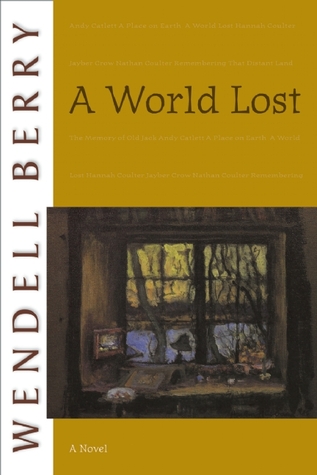In his new novel Wendell Berry returns to the time and the characters found in his earlier and more complex work, A Place on Earth. The atmosphere is familiar: a community subtly unsettled by the distant events of World War II; families still rooted in place through bonds to the land and to each other; homes still functioning as small economies, complete with cellars, smokehouses, henhouses, and gardens; and a continuity of vision that reaches back before the Civil War. As young Andy Catlett, Mr. Berry’s semi-autobiographical protagonist, describes it: “I saw how beautiful the field was, how beautiful our work was. And it came to me all in a feeling how everything fitted together, the place and ourselves and the animals and the tools, and how the sky held us.”
The ostensible focus of this short work is on the strange circumstances surrounding the murder of the boy’s Uncle Andrew. At first, the book appears to be but an extended character study of this figure. Yet Mr. Berry carefully develops two other themes, both encompassed by the novel’s title.
The first concerns the passing of an age, as a distinctive rural culture is quietly buried by social and economic forces accelerated during World War II. Into the 1940’s, Mr. Berry notes, the “life of our fields still depended on the bodily strength and skill of people and horses and mules,” and farming people carried on their lives through the force of custom because “they had never thought of being anything else.” Yet in the period between the deaths of his paternal uncle and of his grandfather—roughly 1944 and 1945—the protagonist sees “a time of ending, not just of lives but of a kind of life and a kind of world.”
But the more insistent message of A World Lost is the end of childhood and adolescence, and the narrator’s passage to adult responsibility. Mr. Berry contrasts the characters of Uncle Andrew and the boy’s father, Henry Catlett. The former was “a man of extraordinary good looks,” of “style,” who “spoke at times a kind of poetry of vulgarity.” A talker and a charmer, with a vaguely sexual aura. Uncle Andrew was harmlessly flirtatious, the friend of every cafe waitress in town. A failure in business and a failure in marriage. Uncle Andrew yet “seemed to be all energy, intolerant of restraint, unpredictable.” At once reckless and calm, “the idea of consequence was always an afterthought” to him. For young Andy, who followed him about in his daily wanderings, “Uncle Andrew was right at the center of the idea I had formed of myself. . . . I had wanted to be like him.”
For his part, Henry, the father, was “purposeful and tireless, sober and passionate, in love with his family and work, true to his obligations.” His excitement for farming and his affection for farm people led him into “a lifelong effort to preserve the economy of the small farms.” Through his labors as a country lawyer and his deep sense of duty to kin, he held a troubled community together. Tempted to direct revenge on the day of his brother’s murder, Henry was restrained by his wife. As Mr. Berry writes: “I can see how near he came to turning loose all that he held together, and how, in holding it together, with my mother’s help, he preserved the possibility of our life here; he quieted himself, lived, stayed on, bore what he had to bear.”
And so, A World Lost becomes in essence an able retelling of an eternal tale: of childish ways cast off, of a boy’s passage to adulthood, and of a young man’s reconciliation with his father by coming to understand the meaning of filial obligation. Shaken by a brutal act from the influence of Uncle Andrew, young Andy “came at last under the influence of my father, as perhaps I was destined to do.”
Transcending his prophetic vision of a rural culture passing away, Berry closes the novel with another vision, startling and powerful, of love, redemption, and reunion. “I imagine,” he writes, “the dead waking, dazed, into a shadowless light in which they know themselves altogether for the first time. It is a light that is merciless until they can accept its mercy; by it they are at once condemned and redeemed. . . . In it they are loved completely, even as they have been, and so are changed into what they could not have been but what, if they could have imagined it, they would have wished to be. That light can come into this world only as love, and love can enter only by suffering.” In this openly Christian affirmation, Mr. Berry finds hope in tragedy, renewal in death. A World Lost becomes an eternity gained, where the author places his “true home” among “that company of immortals with whom I have lived here day by day.”
[A World Lost, by Wendell Berry (Washington, D.C.: Counterpoint) 151 pp., $20.00]

Leave a Reply